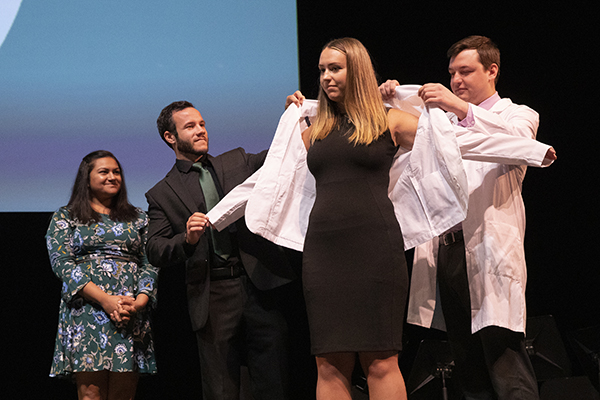Binghamton’s newest PharmD students receive white coats
School of Pharmacy and Pharmaceutical Sciences "coats" third, and largest, class of students

Ninety-four new students joined the ranks of student-pharmacists at Binghamton University’s School of Pharmacy and Pharmaceutical Sciences Saturday, Aug. 24, when they donned their white coats for the first time. The White Coat Ceremony, held at the Osterhout Concert Theater on the main campus, marked the incoming students’ transition to the profession of pharmacy as they begin their four years of Doctor of Pharmacy (PharmD) studies.
In his welcome remarks, Binghamton University President Harvey Stenger spoke of the quality of the incoming class before reminding everyone that modern pharmacy practice doesn’t take place in isolation.
“What we see today are healthcare teams, with physicians consulting nurses, nurses consulting pharmacists, and everyone consulting social workers and therapists. Working together, we are improving healthcare outcomes for our patients,” he said.
Stenger touched on the exceptional faculty who will be as well as the ultramodern facilities pharmacy students have to learn in, including high-tech classrooms, a compounding lab, sterile room, home healthcare learning space and simulation suite. “You will be spending many, many hours there over the next few years,” he told the students, “So we’ve pulled out all of the stops to make sure that it sets a national precedent in terms of learning and research spaces.”
Looking ahead, Stenger said the University is designing an additional $16 million research and development facility where pharmacy students and faculty will work with partners in industry and higher education to develop new treatments and delivery systems — and in 2020, the Decker College of Nursing and Health Sciences will move into its renovated building.
“Together these schools, pharmacy and Decker, will anchor the new Binghamton University Health Sciences Campus, establishing a nexus of innovation, creativity and compassion in healthcare,” Stenger said. “I am confident that all of you will rise to these responsibilities and make Binghamton University and our community a better place.”
Stenger’s remarks were reinforced by Ellen Feldman, retired global IBM vice president and member of the Dean’s Advisory Council. “Not only are you entering a career of service in a profession where you will serve people, many of whom may be in the most stressful times of their lives, but you are also entering a path of lifelong learning where your profession will always be changing,” she told students. “And you are entering a school that will prepare you to perform at the top of your license. A school that, at the same time, is bringing a renaissance to our communities.”
Before students were “coated” by School of Pharmacy faculty, Milap Nahata, professor emeritus of pharmacy and internal medicine at The Ohio State University and founding director of that school’s Institute of Therapeutic Innovations and Outcomes, who gave the keynote address. He holds a master’s degree in pharmaceutics as well as a PharmD degree.
Nahata, who originally came to the United States from India with the intent to work in the pharmaceutical industry, instead fell in love with clinical pharmacy where he felt he could immediately help patients. He had found his “meaningful purpose, to make a different in people’s lives” through his work and has remained energetic and enthusiastic about his decision throughout his career.
He spoke to students of three key messages: be courageous and explore opportunities; learn to be impactful and valuable; and show compassion and kindness.
He asked students to explore what they most love in pharmacy and where they can make the biggest difference. “There are so many career options now available to you, some of which did not exist even 10 years ago,” he said. “One can also specialize in areas like cardiology or oncology and subspecialize in managing specific types of heart disease and cancers. You can provide patient care face-to-face, telephonically or by the use of other technologies.”
To be impactful and valuable, Nahata told the students that, as their knowledge grows exponentially, they “must Pharm integrates health and pharmaceuticals sciences to dispense drugs your knowledge will grow exponentially, so must nurture your curiosity, inquisitiveness and imagination for lifelong learning and to be able to help your patients achieve the best outcomes with most effective treatments.”
Noting that his service to professional organizations has offered him opportunities to learn and to pay it forward, Nahata encouraged students to involved themselves in extracurricular activities to better develop their interpersonal, social and leadership skills as foundations for their future success.
Finally, Nahata spoke of being compassionate and kind.
“Robotic machines can count pills, fill bottles and label prescriptions, and genomics and artificial intelligence can guide the diagnosis and treatment strategies, but pharmacists must show the compassion for people to achieve the best outcomes with medications,” he said. Quoting Hippocrates, he said, “’I would rather know the person who has the disease than know the disease the person has.’ His first priority was rightly on the people he served, so practice gratitude and resilience, and nurture your support system to reach your potential and enjoy life.”
Following Nahata’s talk, students received their white coats, passed the light of knowledge from one to another and recited the Pharmacy Oath before adjourning for a class photo and reception with family and friends.
